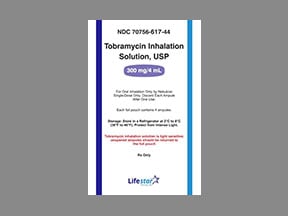
Bethkis Coupons & Savings Card – Discount Prices from $29.93
Brand for: Tobramycin
My prescription
Edit
28 nebulization solutions 4ML of 300MG/4ML, Tobramycin (1 Ampule)
Select pharmacy

CVS
$120.47
COUPON PRICE
Albertsons
$29.93
COUPON PRICE
Walgreens
$32.09
COUPON PRICE
Walmart
$103.24
COUPON PRICEBethkis savings card
Show this card to your pharmacist
Albertsons
$29.93
BIN
ID
PCN
GRP
019876
LHD2056292
CHIPPO
LHX
Powered by
Related aminoglycoside antibiotics prescriptions
More prescriptions for eye infection
Related aminoglycoside antibiotics prescriptions
More prescriptions for eye infection
Bethkis (Tobramycin) dosage forms
Dosage Quantity Price from Per unit 4ML of 300MG/4ML 1 Plas Cont $29.93 $29.93 4ML of 300MG/4ML 2 Plas Conts $52.36 $26.18 4ML of 300MG/4ML 3 Plas Conts $74.78 $24.93
| Dosage | Quantity | Price from | Per unit |
|---|---|---|---|
| 4ML of 300MG/4ML | 1 Plas Cont | $29.93 | $29.93 |
| 4ML of 300MG/4ML | 2 Plas Conts | $52.36 | $26.18 |
| 4ML of 300MG/4ML | 3 Plas Conts | $74.78 | $24.93 |
What is the drug Bethkis used for?
Bethkis is used for managing chronic lung infections caused by Pseudomonas aeruginosa in patients with cystic fibrosis.
What does tobramycin do for the lungs?
Tobramycin is an antibiotic that is used to treat bacterial infections in the lungs, particularly in patients with cystic fibrosis. It works by inhibiting the growth of bacteria, helping to clear the infection and improve lung function. Tobramycin is often administered via inhalation, allowing the medication to directly target the lungs and reduce systemic side effects.
What is the use of Bethkis?
Bethkis is an inhalation solution containing tobramycin, an antibiotic used to treat lung infections caused by Pseudomonas aeruginosa in patients with cystic fibrosis. It helps to reduce the number of bacteria in the lungs, thereby improving breathing and reducing the risk of further lung damage.
What is the generic for Bethkis?
The generic name for Bethkis is tobramycin.
